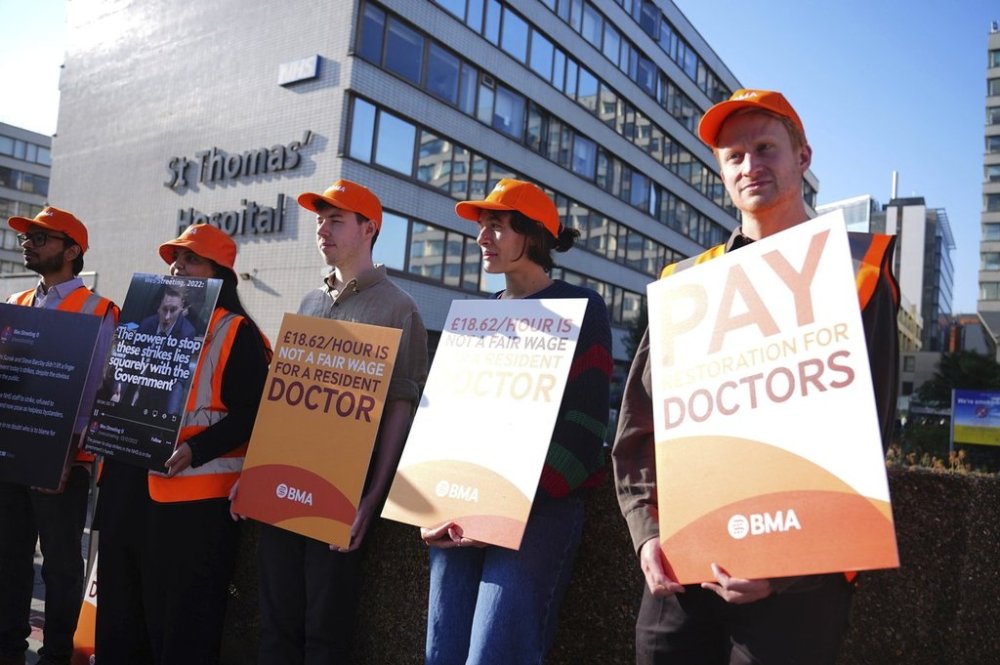World
Thousands of Doctors in England Strike Over Pay Dispute

Thousands of doctors in England’s National Health Service (NHS) began a five-day strike on March 15, 2024, in protest of their pay. The action follows a breakdown in negotiations with the government, which claims the strike will significantly disrupt patient care nationwide.
Resident doctors, who play a crucial role in hospital and clinic operations, participated in picket lines outside medical facilities, highlighting their dissatisfaction with current pay levels. The British Medical Association (BMA) argues that doctors have faced a real-terms pay cut of approximately 20% since 2008, prompting this industrial action.
The NHS has assured the public that emergency departments will remain operational during the strike. Hospitals and clinics are attempting to fulfill as many scheduled appointments as possible, despite the strike’s impact on regular services.
Dr. Melissa Ryan and Dr. Ross Nieuwoudt, co-chairs of the BMA’s resident doctors committee, emphasized the urgency of the situation. They noted that “pay erosion has now got to the point where a doctor’s assistant can be paid up to 30% more than a resident doctor.”
The government, on the other hand, maintains that doctors have received an average pay increase of 28.9% in recent years and has indicated a reluctance to offer further increases. Instead, officials have expressed a willingness to discuss improvements in working conditions.
Prime Minister Keir Starmer addressed the situation in a recent article published in the Times, urging doctors to return to work. He stated, “Most people do not support these strikes. They know they will cause real damage.” Starmer highlighted the consequences for patients, including delays in necessary treatment and the risk of late diagnoses, which could significantly impact their long-term health.
The ongoing strikes reflect a broader trend within the health sector, where staff have engaged in a series of rolling strikes over the past year. This wave of industrial action has been driven by rising living costs and the demand for pay increases to match inflation. As a result, tens of thousands of medical appointments and procedures have been postponed, exacerbating an appointment backlog that ballooned during the COVID-19 pandemic.
Following the election of the Labour government in July 2024, which granted doctors a pay raise, the strikes temporarily ceased. However, the BMA conducted a new strike vote last month, indicating that dissatisfaction among medical professionals remains high.
As this situation unfolds, the implications for patient care and the functioning of the NHS are becoming increasingly concerning. The government and the BMA will need to find common ground to address the issues at hand and ensure that patient care does not suffer as a result of ongoing disputes.
-

 Politics4 weeks ago
Politics4 weeks agoSecwepemc First Nation Seeks Aboriginal Title Over Kamloops Area
-

 World5 months ago
World5 months agoScientists Unearth Ancient Antarctic Ice to Unlock Climate Secrets
-

 Entertainment5 months ago
Entertainment5 months agoTrump and McCormick to Announce $70 Billion Energy Investments
-

 Science5 months ago
Science5 months agoFour Astronauts Return to Earth After International Space Station Mission
-

 Lifestyle5 months ago
Lifestyle5 months agoTransLink Launches Food Truck Program to Boost Revenue in Vancouver
-

 Technology3 months ago
Technology3 months agoApple Notes Enhances Functionality with Markdown Support in macOS 26
-

 Lifestyle3 months ago
Lifestyle3 months agoManitoba’s Burger Champion Shines Again Amid Dining Innovations
-

 Top Stories2 months ago
Top Stories2 months agoUrgent Update: Fatal Crash on Highway 99 Claims Life of Pitt Meadows Man
-

 Politics4 months ago
Politics4 months agoUkrainian Tennis Star Elina Svitolina Faces Death Threats Online
-

 Sports5 months ago
Sports5 months agoSearch Underway for Missing Hunter Amid Hokkaido Bear Emergency
-

 Politics5 months ago
Politics5 months agoCarney Engages First Nations Leaders at Development Law Summit
-

 Technology5 months ago
Technology5 months agoFrosthaven Launches Early Access on July 31, 2025




















